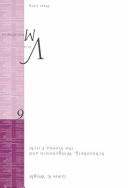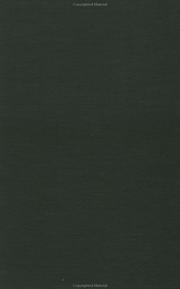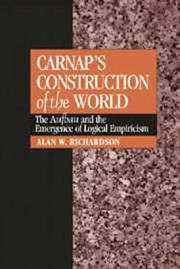| Listing 1 - 10 of 12 | << page >> |
Sort by
|
Book
ISSN: 21054584 ISBN: 9782735115150 2735115151 Year: 2012 Publisher: Paris : Maison des sciences de l'homme,
Abstract | Keywords | Export | Availability | Bookmark
 Loading...
Loading...Choose an application
- Reference Manager
- EndNote
- RefWorks (Direct export to RefWorks)
Présente l'iconographie et la topographie politique élaborée par A. Comte dans le cadre de son projet de transformation du positivisme de discipline scientifique en mouvement social et de théorie sociale en religion sociale.
Sociology --- Positivism --- Sociologie --- Positivisme --- Comte, Auguste, --- Criticism and interpretation --- --France --- --XIXe s., --- History --- XIXe s., 1801-1900 --- Sociology - History - 19th century --- Positivism - History - 19th century --- Comte, Auguste, - 1798-1857 --- Comte, Auguste, 1798-1857 --- France --- Criticism and interpretation.

ISBN: 3465016688 3465016696 9783465016687 9783465016694 Year: 1985 Volume: 53 Publisher: Frankfurt am Main
Abstract | Keywords | Export | Availability | Bookmark
 Loading...
Loading...Choose an application
- Reference Manager
- EndNote
- RefWorks (Direct export to RefWorks)
Theory of knowledge --- Husserl, Edmund --- Positivism --- History --- Husserl, Edmund, --- History. --- -#GROL:SEMI-1-05'19' Huss --- Humanity, Religion of --- Religion of humanity --- Agnosticism --- Deism --- Philosophy --- Philosophy, Modern --- Rationalism --- Religion --- Religions --- Realism --- Husserl, Edmond --- #GROL:SEMI-1-05'19' Huss --- Positivism - History --- Husserl, Edmund, - 1859-1938
Book
ISSN: 12659835 ISBN: 9782738122032 2738122035 Year: 2008 Publisher: Paris : O. Jacob,
Abstract | Keywords | Export | Availability | Bookmark
 Loading...
Loading...Choose an application
- Reference Manager
- EndNote
- RefWorks (Direct export to RefWorks)
Comment les mathématiques, pure création de l'esprit humain, peuvent-elles s'appliquer au monde réel qui nous entoure ? Comment les géométries non euclidiennes, nées de spéculations abstraites, peuvent-elles décrire l'atome ou l'Univers ? Comment la pure logique du calcul des probabilités peut-elle servir à établir les lois de la physique ou les statistiques des assurances ? Ce sont ces questions qu'affronte dans l'entre-deux guerres l'empirisme logique, ce grand courant du rationalisme européen qui suscite aujourd'hui un intérêt nouveau. Ses grandes figures, Carnap, Schlick. Reichenbach et quelques autres, ont été des penseurs très différents et profondément originaux. La philosophie des sciences contemporaine a encore de nombreuses leçons à tirer de leurs innovations conceptuelles et de leurs débats internes, mais aussi de la réflexion sur les limites de leur démarche et sur les obstacles qu'ils ont rencontrés.
Mathematics --- Logical positivism --- Philosophy --- History --- Mathematics - Philosophy - History - 20th century - Congresses --- Logical positivism - History - 20th century - Congresses --- Philosophie et mathématiques --- Positivisme logique --- Philosophie et sciences --- Logique symbolique et mathématique --- Congrès --- Philosophie et mathématiques --- Logique symbolique et mathématique --- Congrès
Book
ISSN: 02497875 ISBN: 2711615006 9782711615001 Year: 2001 Publisher: Paris Vrin
Abstract | Keywords | Export | Availability | Bookmark
 Loading...
Loading...Choose an application
- Reference Manager
- EndNote
- RefWorks (Direct export to RefWorks)
Le livre fondateur de R. Carnap, Der logische Aufbau der Welt (1928), est une œuvre philosophique centrale du XXe siècle. L’Aufbau se situe à l’orée de l’empirisme logique du cercle de Vienne et a ainsi une place essentielle dans la constitution du paradigme de la philosophie analytique. Au confluent des différentes traditions philosophiques du XXe siècle, il contient aussi tous les enjeux de la philosophie de la connaissance contemporaine : question d’une logique de l’expérience et d’une phénoménologie, statut et ontologie du langage de la science, critique de la métaphysique et élimination des “faux problèmes” en philosophie. Après l’émigration de Carnap en Amérique, puis les critiques apportées à l’empirisme logique et au projet même d’Aufbau par ses successeurs, l’Aufbau a été longtemps négligé. Il est aujourd’hui redécouvert, à la lumière de l’évolution de la science et de la théorie de la connaissance contemporaines. Ce volume collectif veut démontrer l’actualité de l’Aufbau, tout en examinant les racines historiques du projet de construction de Carnap et ses conséquences philosophiques.
Carnap, Rudolf --- Knowledge, Theory of --- Logical positivism --- Théorie de la connaissance --- Positivisme logique --- History --- Histoire --- Carnap, Rudolf, --- Théorie de la connaissance --- Logical empiricism --- Neo-empiricism --- Neo-positivism --- Physicalism --- Positivism, Logical --- Unity of science movement --- Language and logic --- Logic --- Meaning (Psychology) --- Positivism --- Reductionism --- Relationism --- Science --- Analysis (Philosophy) --- Verification (Empiricism) --- Vienna circle --- Philosophy --- Carnap, Rudolph --- Karnap, Rudolʹf --- Карнап, Рудольф --- Knowledge, Theory of - History - 20th century. --- Logical positivism - History - 20th century. --- Carnap, Rudolf, - 1891-1970. - Logische Aufbau der Welt. --- Carnap, Rudolf, - 1891-1970.

ISBN: 3039104039 0820470287 9780820470283 9783039104031 Year: 2005 Volume: 6 Publisher: Bern ; Bruxelles ; New York Peter Lang
Abstract | Keywords | Export | Availability | Bookmark
 Loading...
Loading...Choose an application
- Reference Manager
- EndNote
- RefWorks (Direct export to RefWorks)
Music --- Logical positivism --- History and criticism. --- History. --- Schoenberg, Arnold, --- Wittgenstein, Ludwig, --- Criticism and interpretation. --- Vienna (Austria) --- Intellectual life --- Schönberg, Arnold --- Criticism and interpretation --- Wittgenstein, Ludwig --- Austria --- 20th century --- History and criticism --- History --- Music - Austria - Vienna - 20th century - History and criticism. --- Logical positivism - History. --- Schoenberg, Arnold, - 1874-1951 - Criticism and interpretation. --- Wittgenstein, Ludwig, - 1889-1951 - Criticism and interpretation. --- Vienna (Austria) - Intellectual life - 20th century. --- Schoenberg, Arnold, - 1874-1951 --- Wittgenstein, Ludwig, - 1889-1951

ISBN: 0815322631 9780815322634 Year: 1996 Volume: v. 2 Publisher: New York ; London : Garland Pub.,
Abstract | Keywords | Export | Availability | Bookmark
 Loading...
Loading...Choose an application
- Reference Manager
- EndNote
- RefWorks (Direct export to RefWorks)
Logical positivism --- Positivisme logique --- History --- Sources --- Histoire --- Schlick, Moritz, --- Carnap, Rudolf, --- Neurath, Otto, --- Schlick, Moritz --- Neurath, Otto --- Carnap, Rudolf --- -Logical empiricism --- Neo-empiricism --- Neo-positivism --- Physicalism --- Positivism, Logical --- Unity of science movement --- Language and logic --- Logic --- Meaning (Psychology) --- Positivism --- Reductionism --- Relationism --- Science --- Analysis (Philosophy) --- Verification (Empiricism) --- Vienna circle --- -Sources --- Philosophy --- -History --- Logical positivism - History - Sources --- Schlick, Moritz, - 1882-1936 --- Carnap, Rudolf, - 1891-1970 --- Neurath, Otto, - 1882-1945

ISBN: 0521430089 0521052009 0511570813 9780521430081 9780511570810 9780521052009 Year: 1998 Publisher: Cambridge Cambridge University press
Abstract | Keywords | Export | Availability | Bookmark
 Loading...
Loading...Choose an application
- Reference Manager
- EndNote
- RefWorks (Direct export to RefWorks)
This book is a major contribution to the history of analytic philosophy in general and of logical positivism in particular. It provides the first detailed and comprehensive study of Rudolf Carnap, one of the most influential figures in twentieth-century philosophy. The focus of the book is Carnap's first major work: Der logische Aufbau der Welt (The Logical Structure of the World). It reveals tensions within the context of German epistemology and philosophy of science in the early twentieth century. Alan Richardson argues that Carnap's move to philosophy of science in the 1930s was largely an attempt to dissolve the tension in his early epistemology. This book fills a significant gap in the literature on the history of twentieth-century philosophy. It will be of particular importance to historians of analytic philosophy, philosophers of science, and historians of science.
Knowledge, Theory of --- Logical positivism --- History --- Carnap, Rudolf, --- -Logical positivism --- -Logical empiricism --- Neo-empiricism --- Neo-positivism --- Physicalism --- Positivism, Logical --- Unity of science movement --- Language and logic --- Logic --- Meaning (Psychology) --- Positivism --- Reductionism --- Relationism --- Science --- Analysis (Philosophy) --- Verification (Empiricism) --- Vienna circle --- Epistemology --- Theory of knowledge --- Philosophy --- Psychology --- -History --- -Philosophy --- Carnap, Rudolf --- -Carnap, Rudolf --- Logical empiricism --- Arts and Humanities --- Knowledge, Theory of - History - 20th century --- Logical positivism - History - 20th century --- Carnap, Rudolf, - 1891-1970 - Logische Aufbau der Welt
Book
ISBN: 9789048136834 9789048136827 9048136822 9400730624 9786612927898 1282927892 9048136830 Year: 2010 Publisher: Dordrecht Springer Netherlands
Abstract | Keywords | Export | Availability | Bookmark
 Loading...
Loading...Choose an application
- Reference Manager
- EndNote
- RefWorks (Direct export to RefWorks)
The rise of scientific (analytic) philosophy since the turn of the twentieth century is linked to the philosophical interaction between, on the one hand, Ernst Mach, the Vienna Circle around Moritz Schlick and Otto Neurath, the Berlin Group (Hans Reichenbach, Carl G. Hempel), and the Prague Group (Rudolf Carnap, Philipp Frank), and, on the other, philosophers and scientists in Denmark (Niels Bohr, Joergen Joergensen), Finland (Eino Kaila, Georg Henrik von Wright and their disciples), Norway (Arne Næss and his students), and Sweden (Åke Petzäll, the journal Theoria and a younger generation of philosophers in Uppsala). In addition, the pure theory of law of Hans Kelsen achieved wide dissemination in the Nordic countries (through, for example, Alf Ross). One of the key events in the relations between the Central European philosophers and those of the Nordic countries was the Second International Congress for the Unity of Science which was arranged in Copenhagen in 1936. Besides considering the interactions of these groups, the book also pays special attention to their interactions, in the context of the Cold War period following the Second World War, with the so-called Third Vienna Circle and with the Forum Alpbach/Austrian College around Viktor Kraft and Bela Juhos (along with Ludwig Wittgenstein and Paul Feyerabend), where the issues of (philosophical and scientific) realism and "psychologism"—the relationship between psychology and philosophy—were matters of controversy. By comparison with the more extensively investigated and better known transatlantic transfer and transformation of "positivism" and logical empiricism, the developments outlined above remain neglected and marginalized topics in historiography. The symposium aims to reveal the remarkable continuity of the philosophical enlightened "Nordic Connection". We intend to shed light on this forgotten communication and to reconstruct these hidden scholarly networks from an historical and logical point of view, thereby evaluating their significance for today’s research.
Philosophy. --- History of Philosophy. --- Modern Philosophy. --- Logic. --- Philosophy of Science. --- Philosophy (General). --- Philosophy, modern. --- Science --- Logique --- Sciences --- Philosophie --- Logical positivism --- Philosophy --- Vienna circle. --- History. --- Logical positivism -- History. --- Philosophy -- Scandinavia -- History. --- History --- Logical positivism. --- Philosophy, Modern. --- Modern philosophy --- Logical empiricism --- Neo-empiricism --- Neo-positivism --- Physicalism --- Positivism, Logical --- Unity of science movement --- Modern philosophy. --- Philosophy and science. --- Philosophy, general. --- Language and logic --- Logic --- Meaning (Psychology) --- Positivism --- Reductionism --- Relationism --- Analysis (Philosophy) --- Verification (Empiricism) --- Vienna circle --- Argumentation --- Deduction (Logic) --- Deductive logic --- Dialectic (Logic) --- Logic, Deductive --- Intellect --- Psychology --- Reasoning --- Thought and thinking --- Normal science --- Philosophy of science --- Methodology --- Science and philosophy --- Mental philosophy --- Humanities --- Early Modern Philosophy.
Book
ISBN: 3854090382 9783854090380 Year: 1982 Volume: 8/9 Publisher: Wien Löcker
Abstract | Keywords | Export | Availability | Bookmark
 Loading...
Loading...Choose an application
- Reference Manager
- EndNote
- RefWorks (Direct export to RefWorks)
Logical positivism --- History --- Mach, Ernst, --- Popper-Lynkeus, Josef, --- -Logical empiricism --- Neo-empiricism --- Neo-positivism --- Physicalism --- Positivism, Logical --- Unity of science movement --- Language and logic --- Logic --- Meaning (Psychology) --- Positivism --- Reductionism --- Relationism --- Science --- Analysis (Philosophy) --- Verification (Empiricism) --- Vienna circle --- Philosophy --- Mach, Ernst --- Popper-Lynkeus, Josef --- -History --- Logical empiricism --- Popper, Josef, --- Lynkeus, Josef, --- Lynkeus, Josef Popper-, --- Poper-Linḳeʼus, Yosef, --- Linḳeʼus, Yosef Poper-, --- Popper-Lynkeus, Joseph, --- Lynkeus, Joseph Popper-, --- Popper-Linkeus, Iosif, --- Linkeus, Iosif Popper-, --- פופר־לינקאוס, יוסף --- פופר־לינקאוס, יוסף, --- פופר־לינקיאוס, יוסף, --- Ma-ho, En-ssu-tʻe, --- Makh, Ėrnst, --- Logical positivism - History --- Mach, Ernst, - 1838-1916 --- Popper-Lynkeus, Josef, - 1838-1921
Book
ISBN: 8822239857 9788822239853 Year: 1992 Volume: 126 Publisher: Firenze Olschki
Abstract | Keywords | Export | Availability | Bookmark
 Loading...
Loading...Choose an application
- Reference Manager
- EndNote
- RefWorks (Direct export to RefWorks)
Positivism --- Philosophy, Italian --- History. --- -Philsoophy, Italian --- -Philosophy, Italian --- -Italian philosophy --- Humanity, Religion of --- Religion of humanity --- Agnosticism --- Deism --- Philosophy --- Philosophy, Modern --- Rationalism --- Religion --- Religions --- Realism --- History --- Hegel, Georg Wilhelm Friedrich --- -Influence --- -History --- -Hegel, Giorgio Guglielmo Frederico --- Influence --- Italian philosophy --- Hegel, Georg Wilhelm Friedrich, --- Hegel, Giorgio Guglielmo Frederico --- Influence. --- Hēgeru, --- Hei-ko-erh, --- Gegelʹ, Georg, --- Hījil, --- Khegel, --- Hegel, G. W. F. --- Hegel, --- Hei Ge Er, --- Chenkel, --- Hīghil, --- הגל, --- הגל, גאורג וילהלם פרידריך, --- הגל, גיאורג וילהלם פרידריך, --- הגל, ג.ו.פ, --- היגל, גורג ווילהלם פרדריך, --- היגל, גיורג וילהלם פרידריך, --- 黑格尔, --- Hegel, Guillermo Federico, --- Hegel, Jorge Guillermo Federico, --- Heyel, Georg Wilhelm Friedrich, --- Higil, Gʼūrg Vīlhim Frīdrīsh, --- هگل, --- هگل، گئورگ ويلهم فريدريش, --- Positivism - History. --- Philosophy, Italian - History.
| Listing 1 - 10 of 12 | << page >> |
Sort by
|

 Search
Search Feedback
Feedback About UniCat
About UniCat  Help
Help News
News